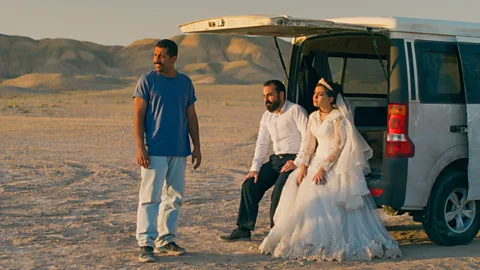It Was Just an Accident review: Jafar Panahi's 'taut revenge thriller' becomes frontrunner to take Cannes' top prize
 Courtesy of the Cannes Film Festival
Courtesy of the Cannes Film FestivalAfter years of imprisonment and travel bans in his native Iran, Jafar Panahi returns to Cannes with a furious but funny revenge thriller that takes aim at oppressive regimes and could scoop the Palme d'Or.
The film opens with a long, unbroken, deceptively charming shot of a genial man (Ebrahim Azizi) and his happy, pregnant wife driving in the countryside one evening, with their playful daughter in the back seat. When the car breaks down, the husband persuades a mechanic to tinker with it, but then the mechanic's rumpled colleague Vahid (Vahid Mobasseri) recognises a chilling combination of sounds: the uneven footsteps of someone with a limp, and the squeaks of an artificial leg.
One of the themes running through the competition films at this year's Cannes Film Festival is how hard it can be to battle your way to justice when the state is standing in your way. In Two Prosecutors, the bureaucracy in Stalin's USSR grinds truth to dust. In Eagles of the Republic, an Egyptian actor finds himself being directed by slimy officials, both at work and at home. Dossier 137 is set in today's France, but even there, a police investigation is obstructed by systems that protect some kinds of wrongdoers more than others.
The most immediate and personal of these films is It Was Just an Accident, written and directed by Jafar Panahi. Panahi has repeatedly been imprisoned and banned from film-making in his native Iran, and has been subject to so many travel bans that he hasn't been in Cannes since 2003 (although his films have), so it's hardly surprising that his latest film is so frank about life under an oppressive regime. What may be more surprising is that It Was Just an Accident balances fury with warmth, humour and sympathy for its characters, even when taking on the grimmest possible subject matter.
These sounds, which have haunted Vahid's nightmares for years, recall someone he calls Peg Leg, a sadistic interrogator who tortured him while he was incarcerated on trumped-up sedition charges. On impulse, Vahid knocks the man out with a shovel, and stuffs him in a box in the back of his van. He plans to bury Peg Leg alive in the desert – and the film, with its dusty mountain vistas, comes to feel like a classic Western tale of frontier justice.
But wait. Vahid was always blindfolded while he was in prison, and so he can't be certain that the man he has caught is Peg Leg, after all. He decides to drive into the city to get a second opinion from a friend who was locked up with him, but even then, things aren't so simple. Before long, Vahid's van is full of former prisoners arguing over the question, including a shrewd wedding photographer (Mariam Afshari), an angry woman (Hadis Pakbaten) who is getting married the next day, and a bitter man (Mohamad Ali Elyasmehr) who is more than willing to throttle Vahid's captive, whether he is Peg Leg or not.
It Was Just an Accident
Director: Jafar Panahi
Cast: Mariam Afshari, Ebrahim Azizi, Vahid Mobasseri)
Run-time: 1hr 41m
It Was Just an Accident is a taut and twisting revenge thriller loaded with heavyweight ethical quandaries. It is heartbreakingly explicit about what the well-drawn characters have suffered, but it asks whether they can ever be justified in using the same methods – abduction, torture – as their oppressors. Even if they can be sure that their captive is Peg Leg, do they have the right to execute him? On the other hand, do they have a choice? Have they gone so far that they will be in more trouble if they release him than if they finish the job?
More like this:
• Gay romance The History of Sound is 'too polite'
Panahi mixes these issues with a healthy dose of comedy. Vahid and his associates are no bloodthirsty vigilantes, but a bickering bunch who may be foiled in their mission by running out of petrol: at one point, they have to push the van to a garage, including the bride-to-be in her white wedding dress. Meanwhile, they aren't just looking over their shoulders for the secret police, they're being irritated by endemic, low-level corruption. One of several wry examples has two security guards producing their own portable card readers so that they can accept bribes from people who don't have any cash on them.
These farcical vignettes aren't just light relief, though. They bolster Panahi's powerful point that heroes and villains aren't all monumental figures in uniform. Those who have committed the worst evils, those who have endured them, and those who have stood back and let those evils happen, can all be seen on any sunny city street, getting on with their ordinary lives with friends and relatives.
Panahi puts these terrifying yet touchingly humane insights into a film that is as fast-moving and unpretentious as any crime caper. He could well go back to Iran with Cannes' top prize, the Palme d'Or, after the festival finishes this weekend.
★★★★☆
--
If you liked this story, sign up for The Essential List newsletter – a handpicked selection of features, videos and can't-miss news, delivered to your inbox twice a week.
